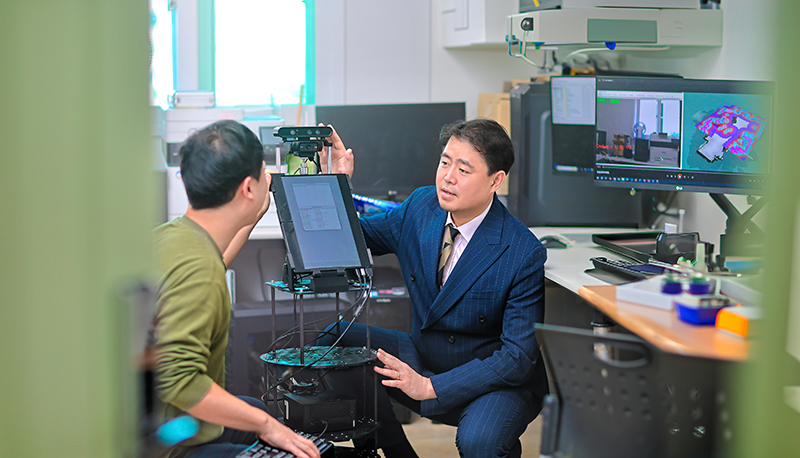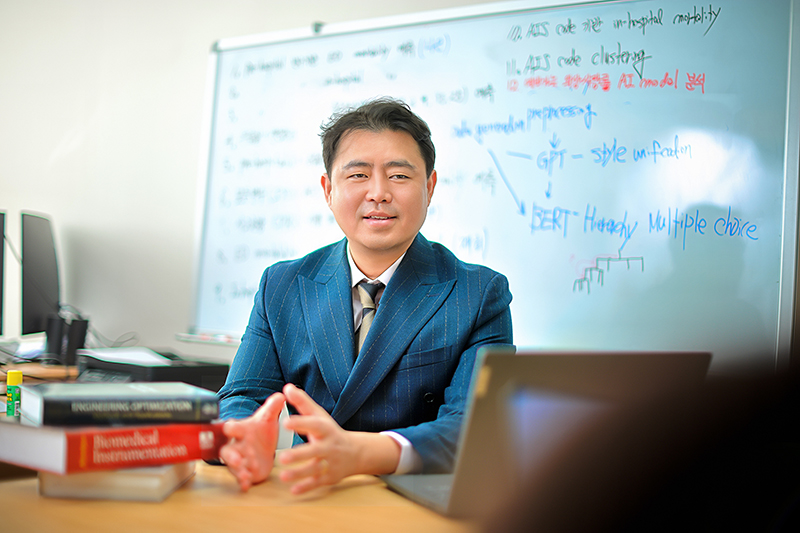header
News
At the forefront of the Global AI Frontier Lab Project, Kyung Hee Leads Medical AI Innovation
- WRITER 학무부총장실

Professor Jinseok Lee at the Department of Biomedical Engineering wins the Global AI Frontier Lab·University ICT Research Center Project
Professor Jinseok Lee will take the lead in medical AI research by joining the Global AI Frontier Lab project. Supported by the Ministry of Science and ICT and the National IT Industry Promotion Agency, this project aims to proactively position itself at the forefront of global technological hegemony through world-class collaborative research initiatives with New York University and top domestic universities. The project is divided into AI Basic Research, AI Ethics & Alignment, and Medical & Healthcare AI, with Professor Lee focusing on the Medical & Healthcare AI field.
The ultimate goal of the medical·healthcare AI field is to drastically reduce the preventable trauma mortality rate.

While Korea’s preventable trauma mortality rate has significantly decreased from 27.4% in 2015 to 10% in 2021, it requires further improvement compared to other top OECD countries such as the United States, where the rate is below 5%. Major developed countries have made substantial investment in emergency medicine to lower this rate. Professor Lee explained, "Korea faces a critical shortage of medical staff in emergency medicine, particularly in trauma care. Effective trauma care requires 24/7 readiness and rapid intervention, yet we lack specialized medical staff to meet these demands. We plan to address this problem by incorporating medical AI technology into our trauma care system." In the new system, AI can actively intervene in all processes from initial stabilization to surgery and postoperative recovery in order to identify ways to increase patient survival rates in real time.
AI also assists in surgical preparation and during surgery by analyzing medical images like X-rays, CTs, and ultrasounds. It provides essential patient information such as medical history and allergies, as well as offering real time analysis during surgery to the medical staff to help intraoperative decision-making to take appropriate steps and care. This study will collect data from eight regional trauma centers in Korea to develop a research model.
Data on American patients will also be integrated into the model through joint research with New York University. In addition to patient data collaboration, Kyung Hee is conducting joint research with NYU in various ways including joint-development of a medical imaging foundation model. The goal is to diagnose all current and emerging forms of diseases with the developed medical imaging model that can predict the potential onset of future conditions.

In addition to the Global AI Frontier Lab project, Professor Lee is developing convergence education in emergency medicine through the University ICT Research Center project. This initiative not only integrates convergence education but also facilitates academic exchanges with top universities around the world, including Harvard University, New York University, and Cornell University. Professor Lee stressed, “Our goal is to establish an entirely new educational research system—one that does not yet exist—so that students can explore diverse subjects to grow into creative leaders of future who will tackle new challenges that we do not yet know of.”
The project will span seven years and six months, focusing on such research areas as ventricular fibrillation diagnosis prediction and the development of a virtual emergency room platform. Professor Lee explained, “It offers various opportunities for interdisciplinary collaboration across bioengineering, computer engineering, medicine, and pharmacy.” He concluded, “Kyung Hee aims to strengthen its position as a leading research institute in Korea and globally, particularly in the field of artificial intelligence for emergency trauma medicine.”